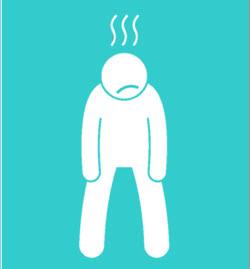Your Feet Are Two Good Reasons to Take Your Diabetes Seriously
Managing diabetes can be complex, but it shouldn’t mean missing out on the good things in life, like feeling the scrunchy sand under your feet, dipping your feet surf, long hikes in the park with your family. Keeping blood glucose levels within range can help prevent complications such as those that affect your feet1. High blood glucose can cause nerve damage (neuropathy) especially in the limbs (example both legs and feet). In addition, poor circulation caused by diabetes may lead to more serious problems like diabetic foot ulcer and infections and even deformity of the feet...
Read MoreWhat Is Diabetes?
Diabetes is a chronic disease. Your blood glucose (blood sugar) levels are controlled by insulin, a hormone produced by your pancreas. When you eat, food gets broken down and glucose enters your bloodstream. Insulin takes the glucose out of your bloodstream and allows it to enter your cells where it is broken down and turned into energy. If you have diabetes, either you don’t have enough insulin or the insulin you do have doesn’t work to get the glucose out of your blood and into your cells. This is how your blood glucose ends up going higher than it should (hyperglycemia).1 3 main types of...
Read MoreNewly diagnosed? Here’s what to do now.
It’s never easy to be diagnosed with diabetes. You may wonder, “Why is this happening?” and may fear the unknown. It’s common to blame yourself and worry about what others will think of you. What’s most important is that you acknowledge all of your emotions as they come and go, resolve to deal with them, and understand that you are not alone. The first step in taking control of your health after a diagnosis is making an appointment with your primary healthcare provider (or endocrinologist, or diabetes nurse, etc.), and finding out everything you can about your diabetes. To start, you should find out:...
Read MoreEverything About Low Blood Glucose (Hypoglycemia)
Low blood glucose is also known as hypoglycemia which is a medical terminology. Some call it ‘hypo’ for short. It usually happens in people with diabetes who take medication especially increased dose of insulin, exercising more than usual, miss their meals or reduced their meals. People with diabetes who experience ‘hypo’ usually experience some signs or if their blood glucose is tested, it could be below 4.0mmol/L. It is very important to recognize the early signs of ‘hypo’ and treat it quickly. Educate your colleagues, friends and family members to enable them to help with treatment when you experience ‘hypo’. If left...
Read MoreYour Feet Are Two Good Reasons to Take Your Diabetes Seriously
Managing diabetes can be complex, but it shouldn’t mean missing out on the good things in life, like feeling the scrunchy sand under your feet, dipping your feet surf, long hikes in the park with your family. Keeping blood glucose levels within range can help prevent complications such as those that affect your feet1. High blood glucose can cause nerve damage (neuropathy) especially in the limbs (example both legs and feet). In addition, poor circulation caused by diabetes may lead to more serious problems like diabetic foot ulcer and infections and even deformity of the feet...
Read MoreCommon Symptoms Of Diabetes
The onset of type 1 diabetes usually happens fast, and symptoms may be intense. Symptoms of type 2 diabetes are usually mild (or even not there at all), and appear over time. Common symptoms of either type include:2 If you haven’t been diagnosed with diabetes and show any of these symptoms, talk to your doctor.
Read MoreYour Eyes Are Two Good Reasons To Take Care Of Your Diabetes
Managing diabetes can be complex, but it should not mean missing out on the good things in life, like watching a sunset or reading a book. Keeping blood glucose levels within range can help prevent complications such as those that affect your eyes. Over time, diabetes may cause damage to the eyes which can lead to poor vision or even blindness. Diabetic retinopathy is the most common complication of diabetes and affects one third of people living with diabetes.1 RISK FACTOR Beyond poorly managed diabetes, smoking, high blood...
Read MoreHow to Celebrate The Holidays and Stay In Range
While the holidays are all about family and festivities, a whole lot of food shows up at holiday gatherings. The parties and travel can disrupt your normal routine — and the celebrations can last for weeks. How can you stick to your meal plan and keep your blood sugar in range while still enjoying the holidays? It’s not always easy. But with a little planning, it’s possible! 1. Start with a Plan...
Read MoreWhat Is Diabetes?
Diabetes is a chronic disease. Your blood glucose (blood sugar) levels are controlled by insulin, a hormone produced by your pancreas. When you eat, food gets broken down and glucose enters your bloodstream. Insulin takes the glucose out of your bloodstream and allows it to enter your cells where it is broken down and turned into energy. If you have diabetes, either you don’t have enough insulin or the insulin you do have doesn’t work to get the glucose out of your blood and into your cells. This is how your blood glucose ends up going higher than it should (hyperglycemia).1 3 main types of...
Read MoreNewly diagnosed? Here’s what to do now.
It’s never easy to be diagnosed with diabetes. You may wonder, “Why is this happening?” and may fear the unknown. It’s common to blame yourself and worry about what others will think of you. What’s most important is that you acknowledge all of your emotions as they come and go, resolve to deal with them, and understand that you are not alone. The first step in taking control of your health after a diagnosis is making an appointment with your primary healthcare provider (or endocrinologist, or diabetes nurse, etc.), and finding out everything you can about your diabetes. To start, you should find out:...
Read MoreEverything About Low Blood Glucose (Hypoglycemia)
Low blood glucose is also known as hypoglycemia which is a medical terminology. Some call it ‘hypo’ for short. It usually happens in people with diabetes who take medication especially increased dose of insulin, exercising more than usual, miss their meals or reduced their meals. People with diabetes who experience ‘hypo’ usually experience some signs or if their blood glucose is tested, it could be below 4.0mmol/L. It is very important to recognize the early signs of ‘hypo’ and treat it quickly. Educate your colleagues, friends and family members to enable them to help with treatment when you experience ‘hypo’. If left...
Read MoreYour Feet Are Two Good Reasons to Take Your Diabetes Seriously
Managing diabetes can be complex, but it shouldn’t mean missing out on the good things in life, like feeling the scrunchy sand under your feet, dipping your feet surf, long hikes in the park with your family. Keeping blood glucose levels within range can help prevent complications such as those that affect your feet1. High blood glucose can cause nerve damage (neuropathy) especially in the limbs (example both legs and feet). In addition, poor circulation caused by diabetes may lead to more serious problems like diabetic foot ulcer and infections and even deformity of the feet...
Read MoreCommon Symptoms Of Diabetes
The onset of type 1 diabetes usually happens fast, and symptoms may be intense. Symptoms of type 2 diabetes are usually mild (or even not there at all), and appear over time. Common symptoms of either type include:2 If you haven’t been diagnosed with diabetes and show any of these symptoms, talk to your doctor.
Read MoreYour Eyes Are Two Good Reasons To Take Care Of Your Diabetes
Managing diabetes can be complex, but it should not mean missing out on the good things in life, like watching a sunset or reading a book. Keeping blood glucose levels within range can help prevent complications such as those that affect your eyes. Over time, diabetes may cause damage to the eyes which can lead to poor vision or even blindness. Diabetic retinopathy is the most common complication of diabetes and affects one third of people living with diabetes.1 RISK FACTOR Beyond poorly managed diabetes, smoking, high blood...
Read MoreHow to Celebrate The Holidays and Stay In Range
While the holidays are all about family and festivities, a whole lot of food shows up at holiday gatherings. The parties and travel can disrupt your normal routine — and the celebrations can last for weeks. How can you stick to your meal plan and keep your blood sugar in range while still enjoying the holidays? It’s not always easy. But with a little planning, it’s possible! 1. Start with a Plan...
Read More






